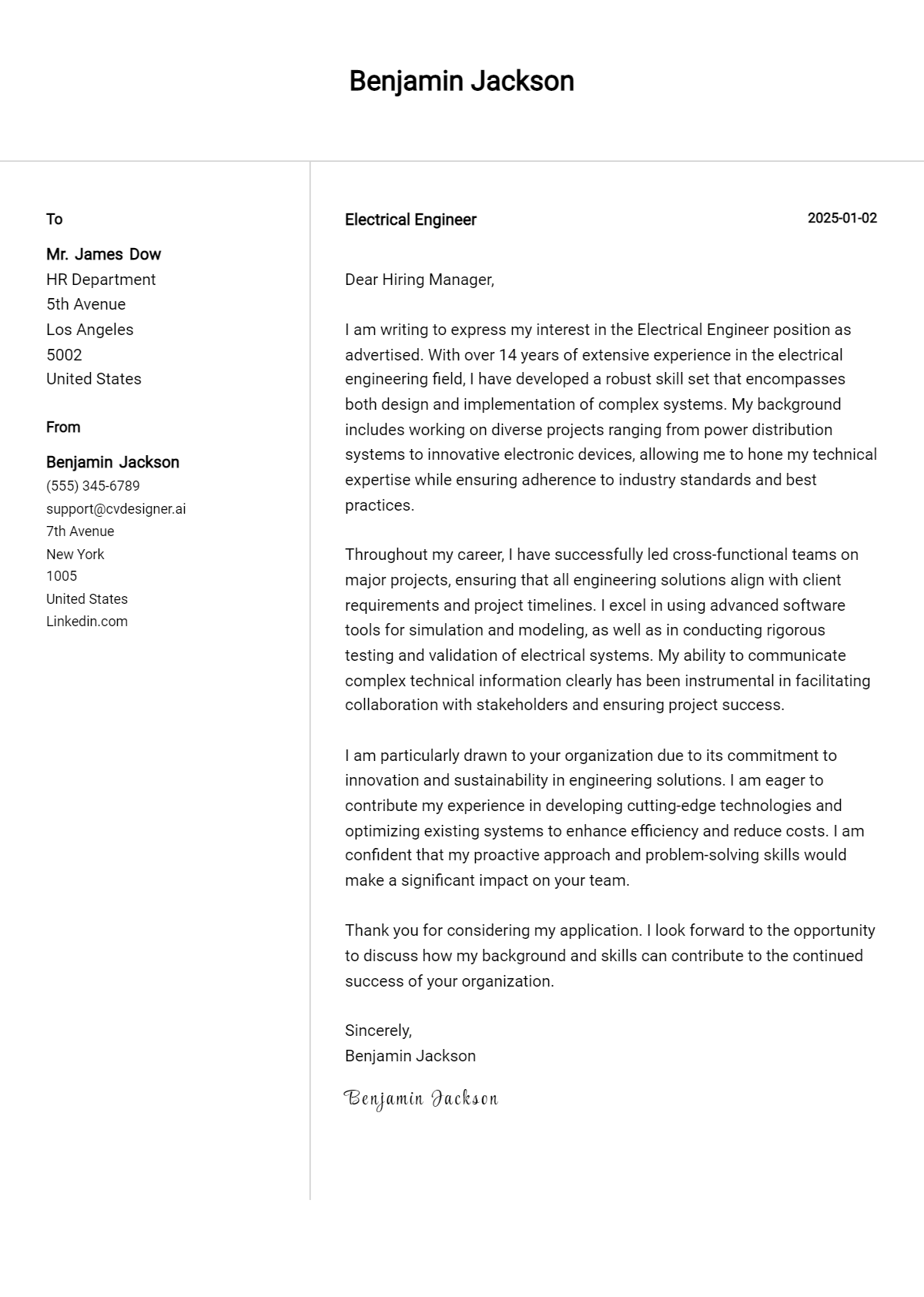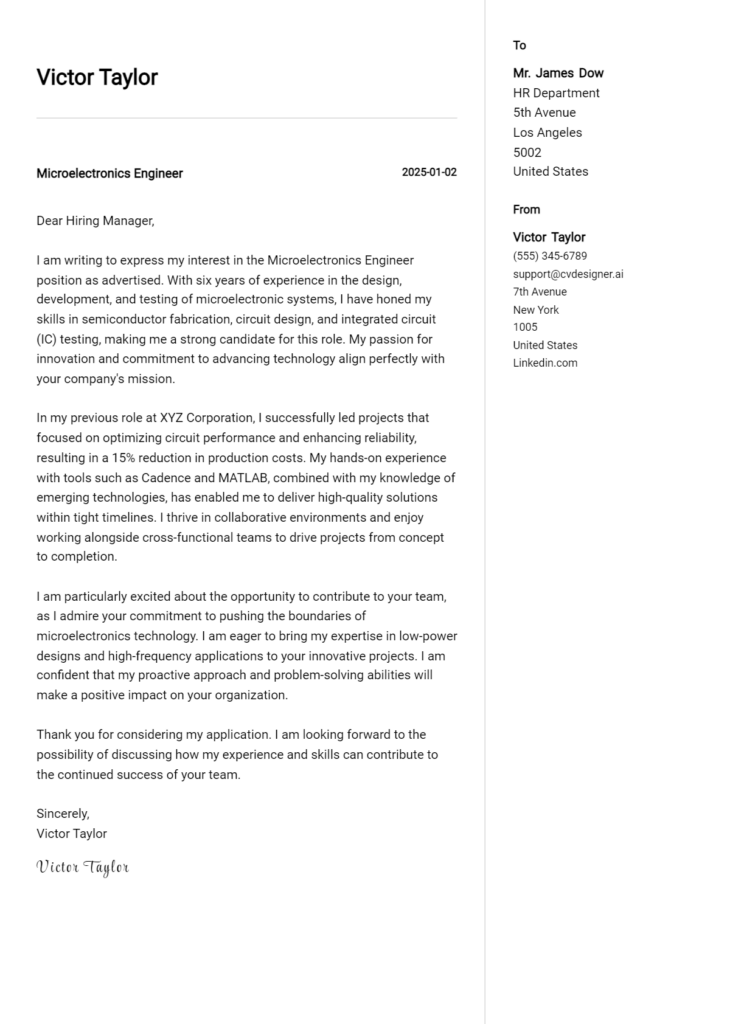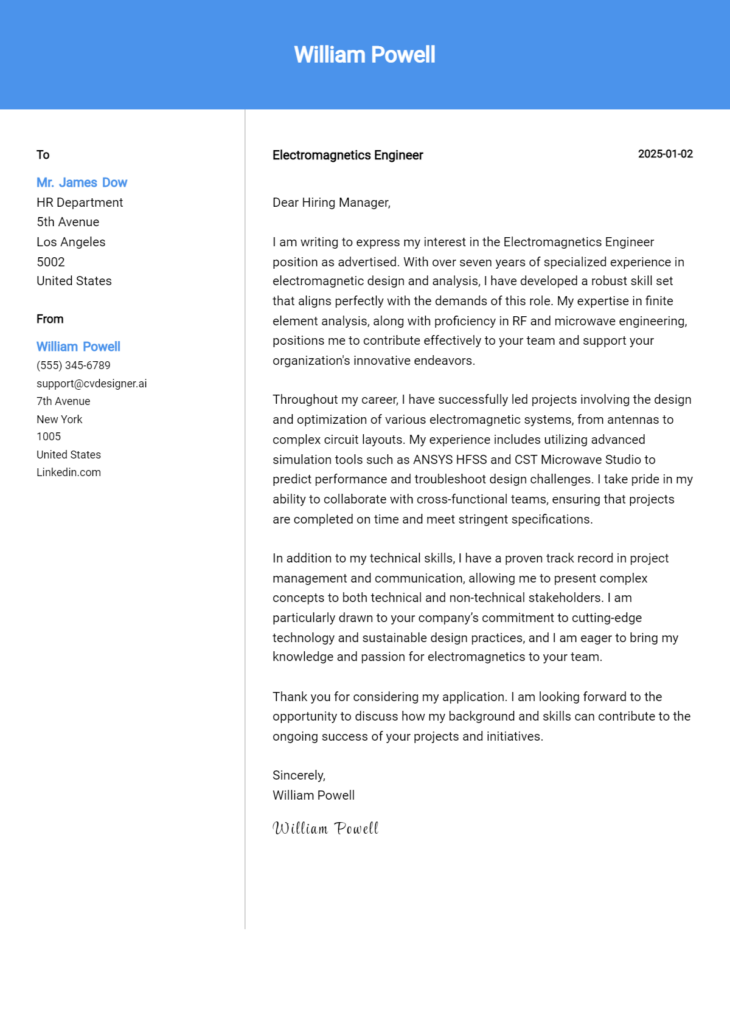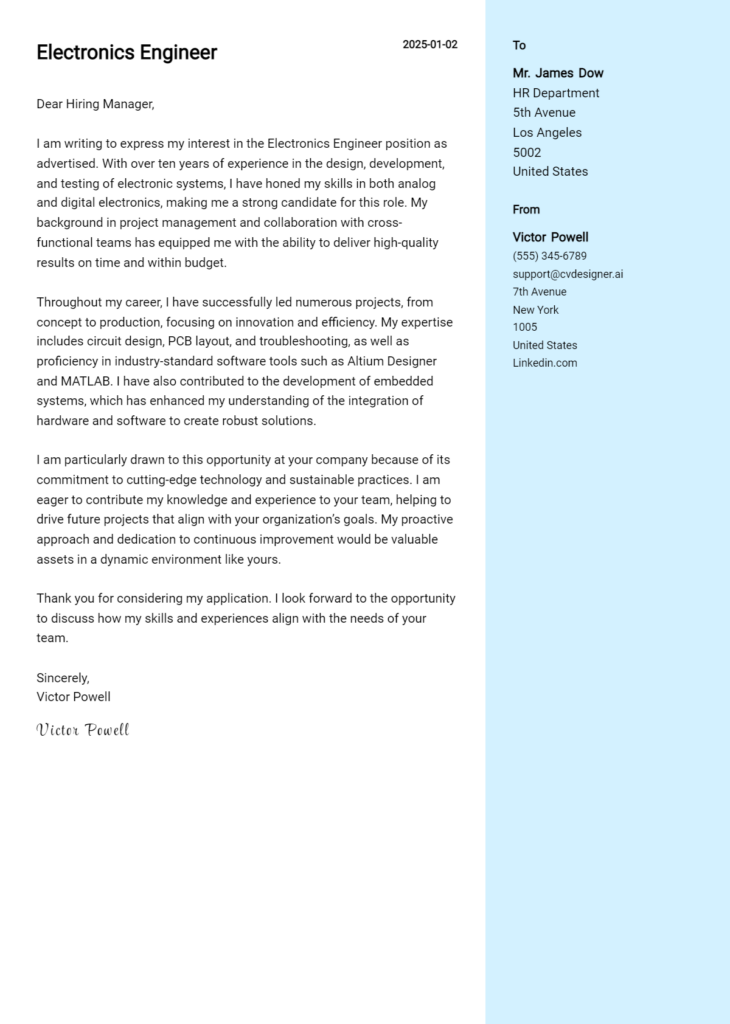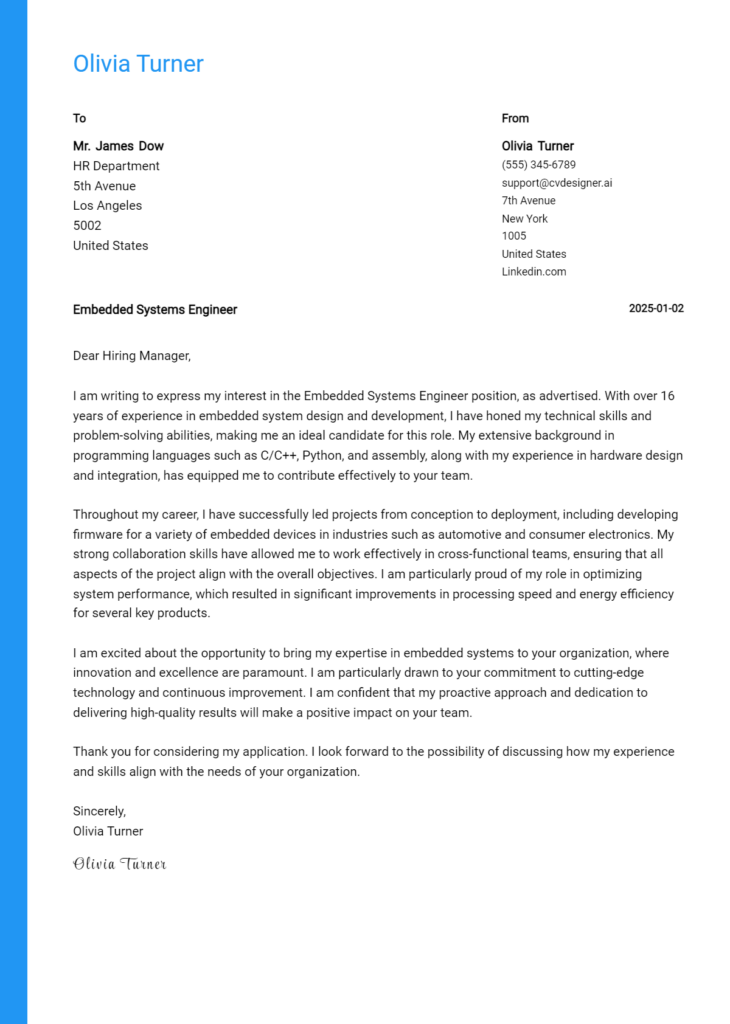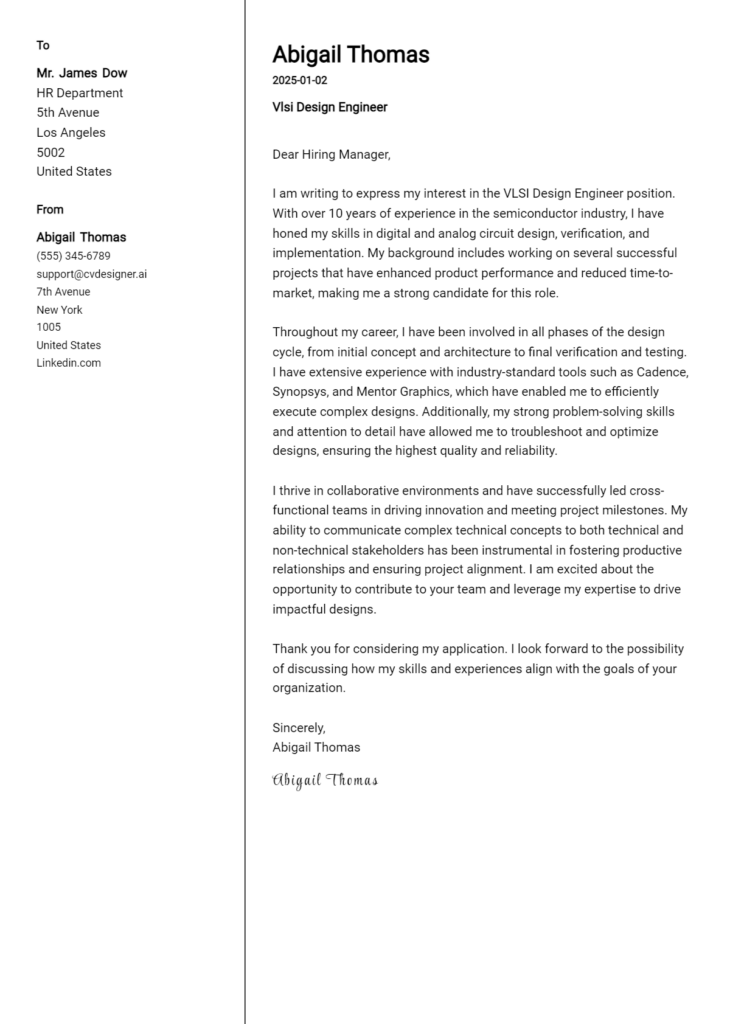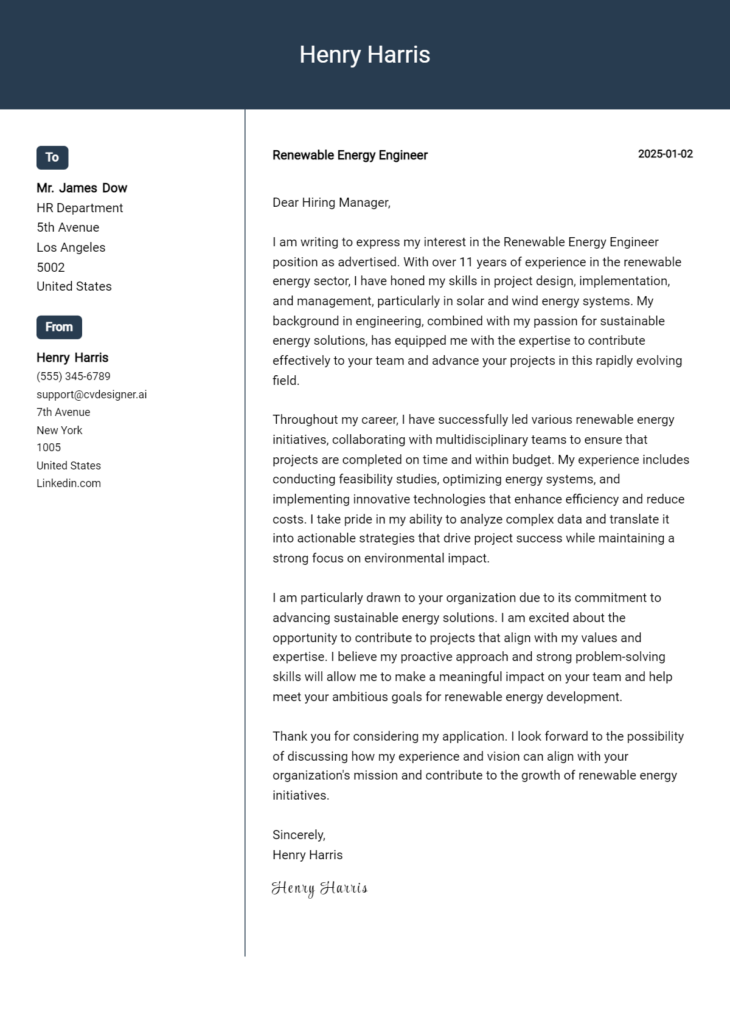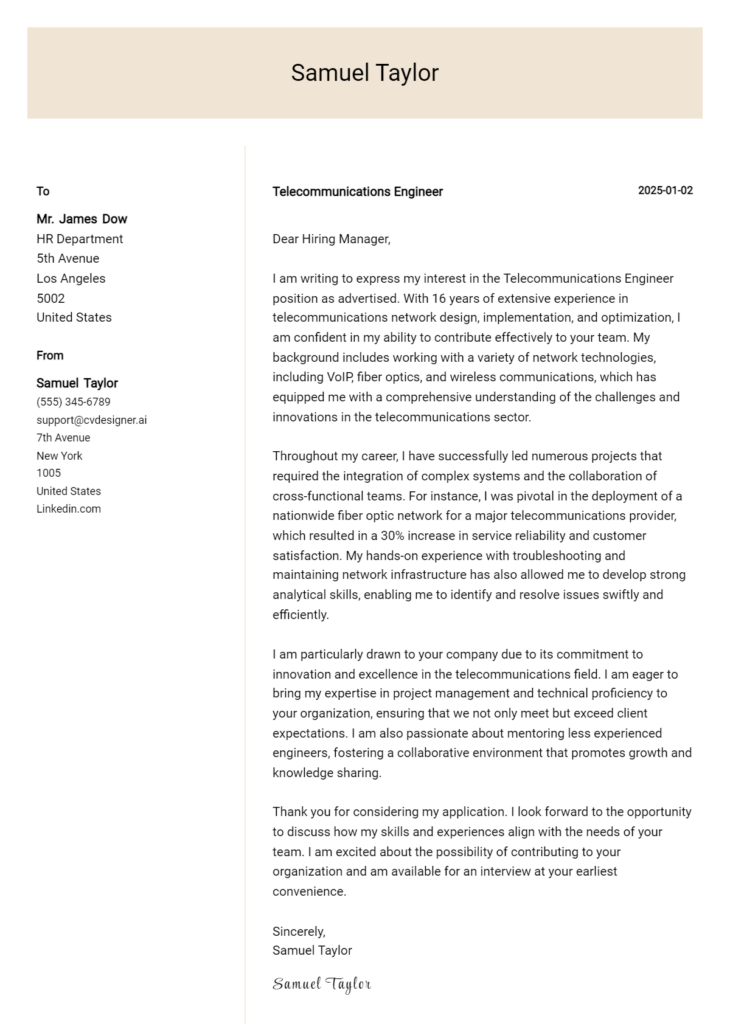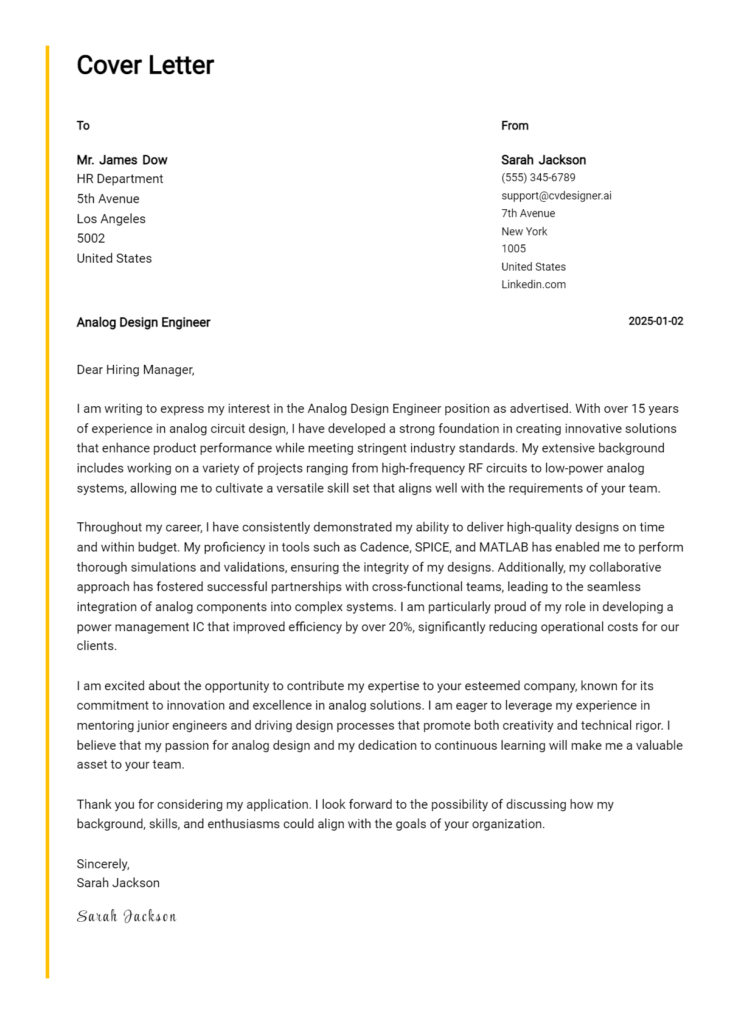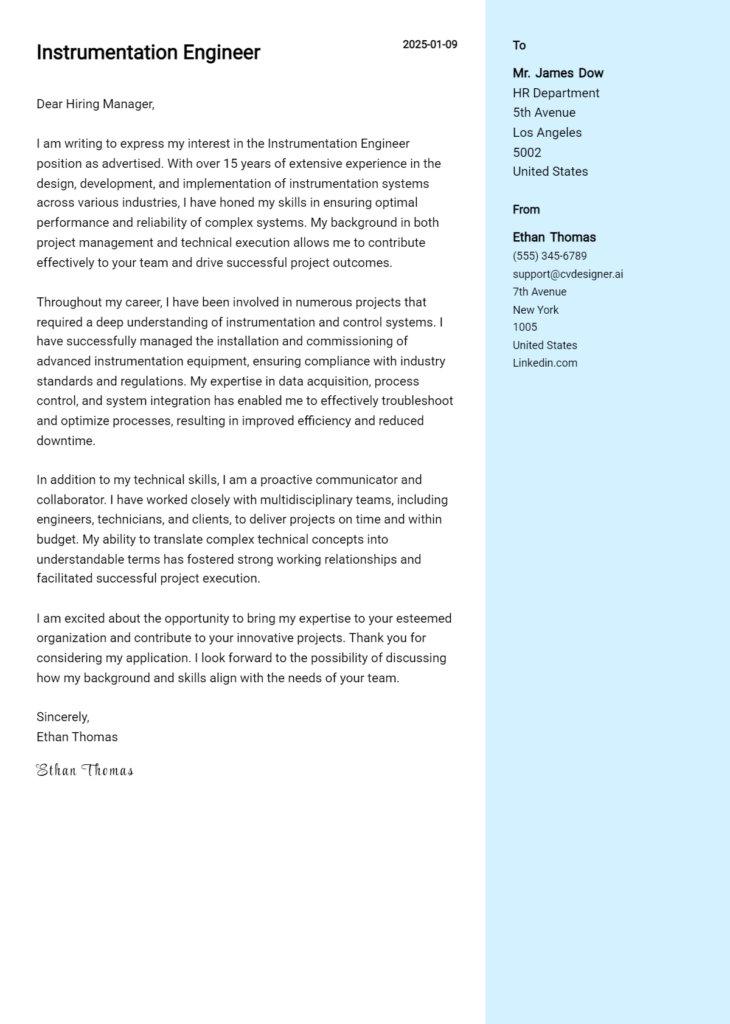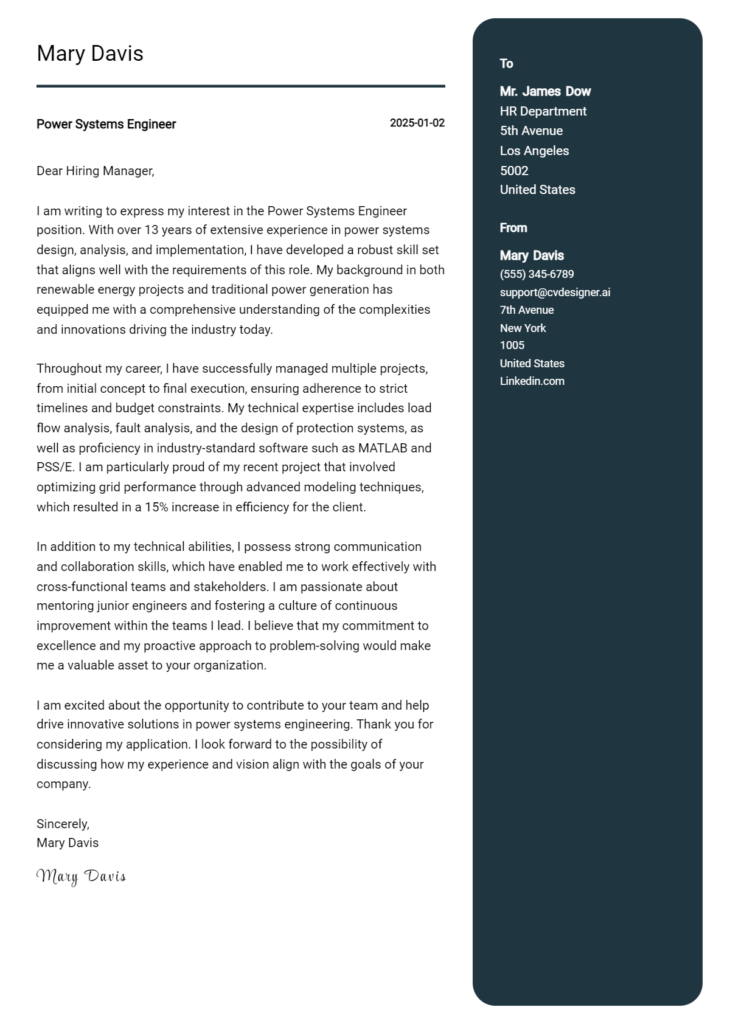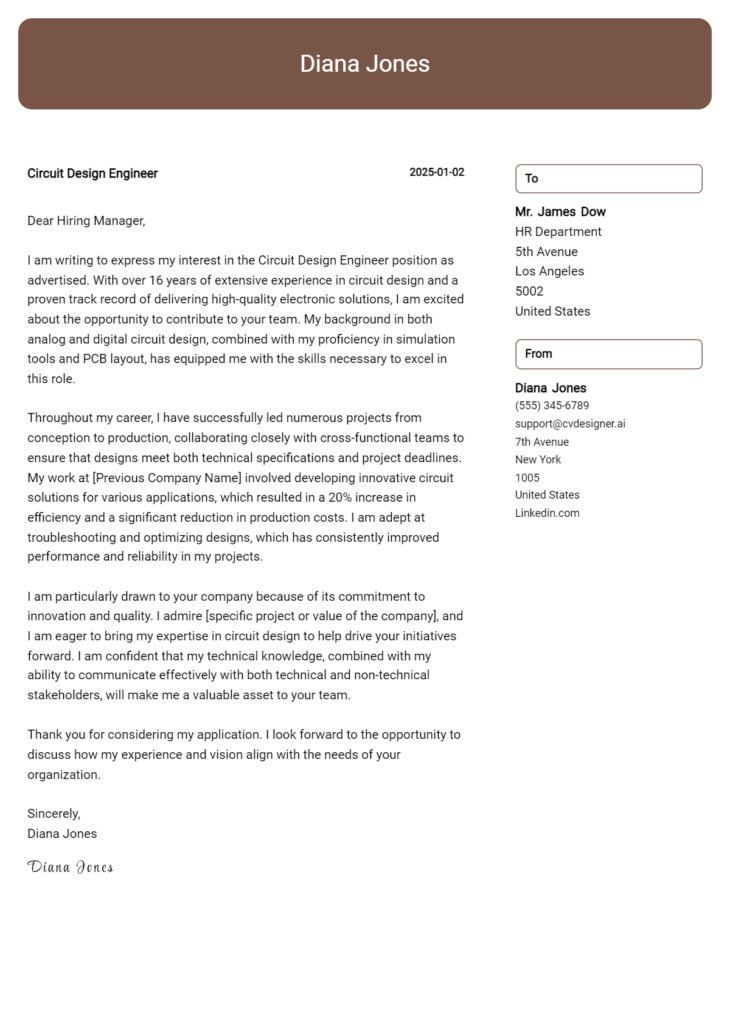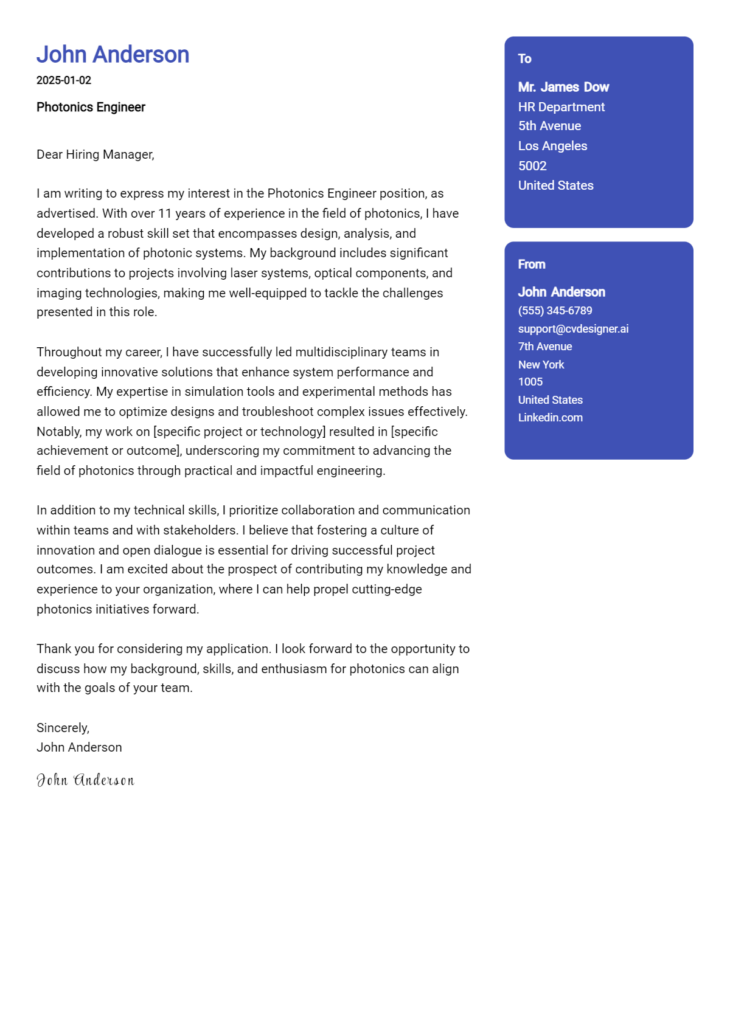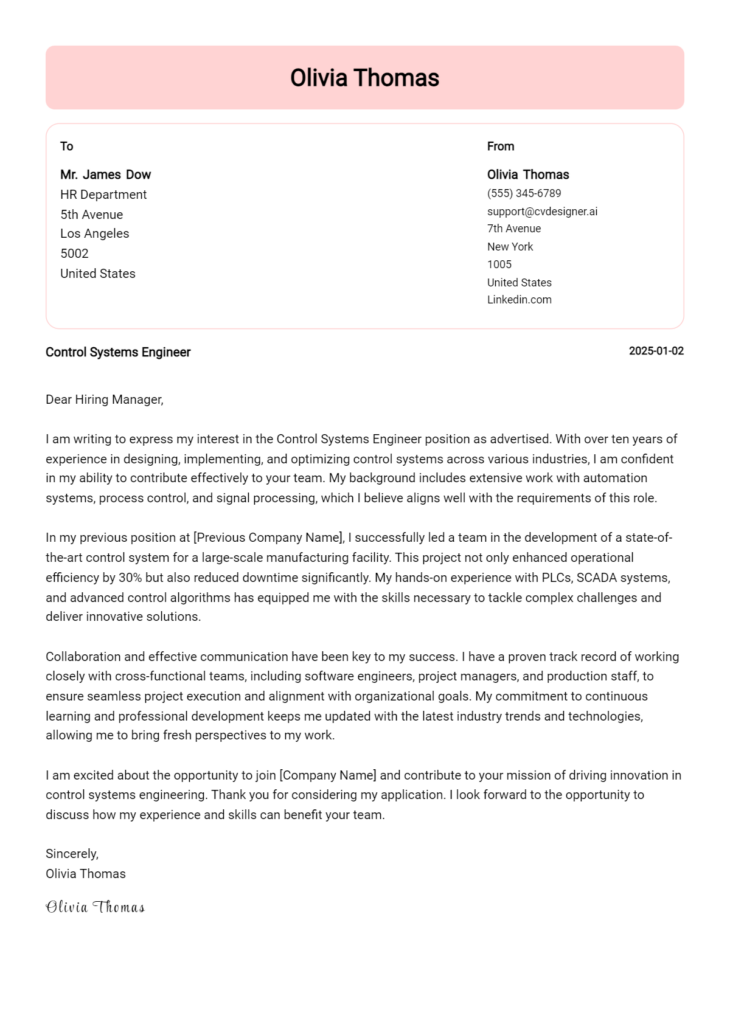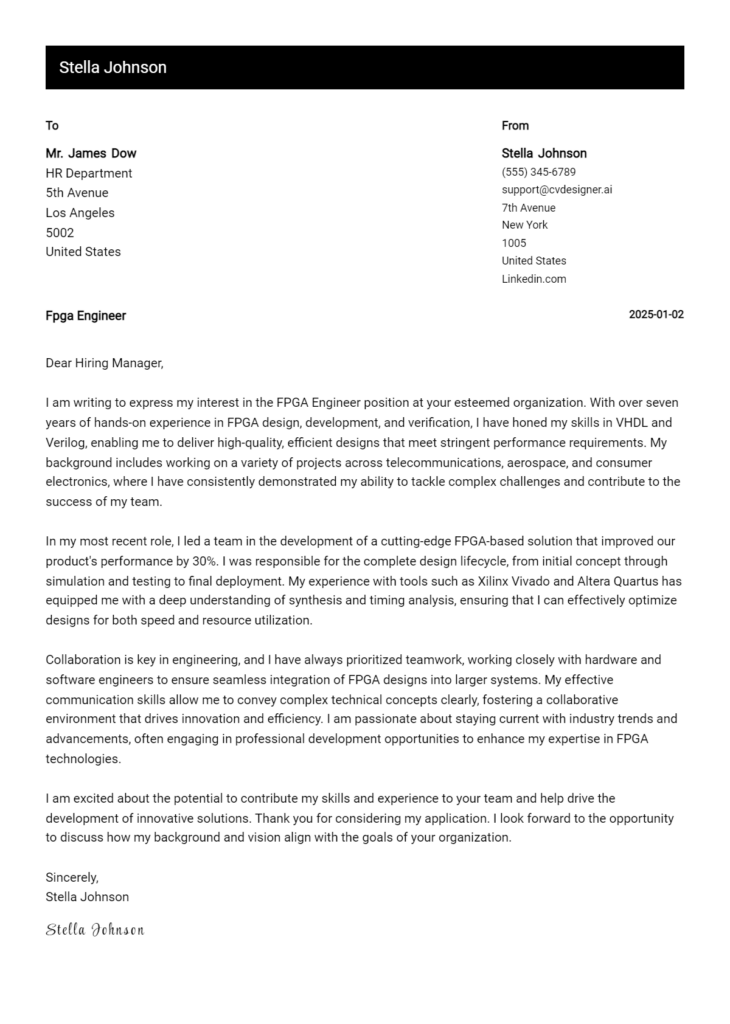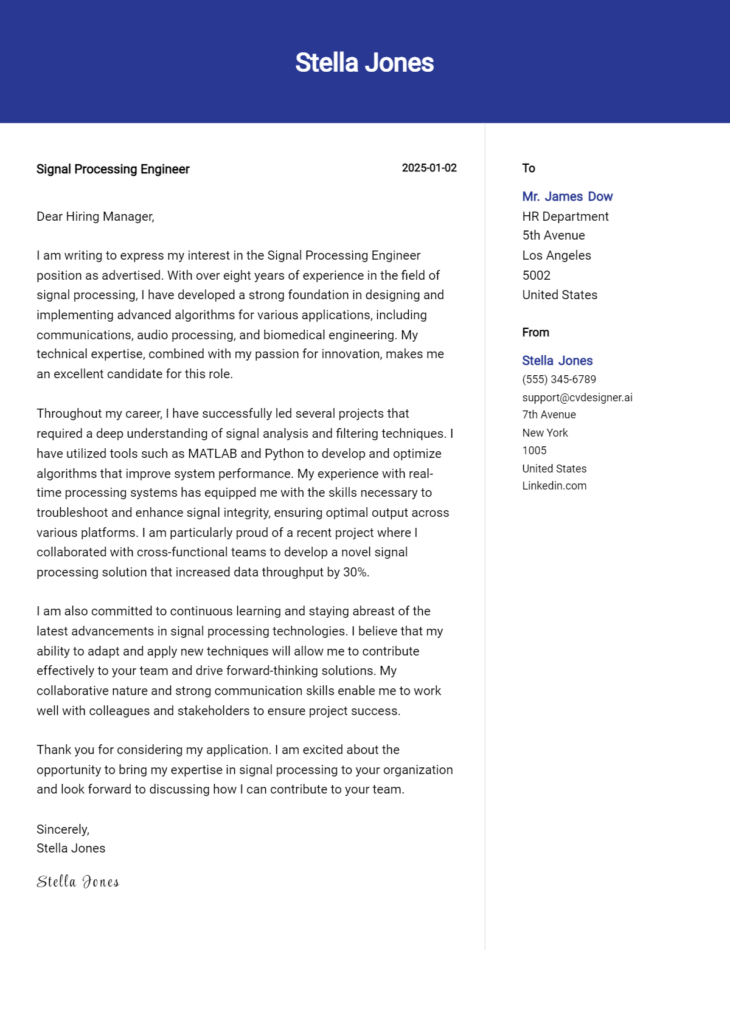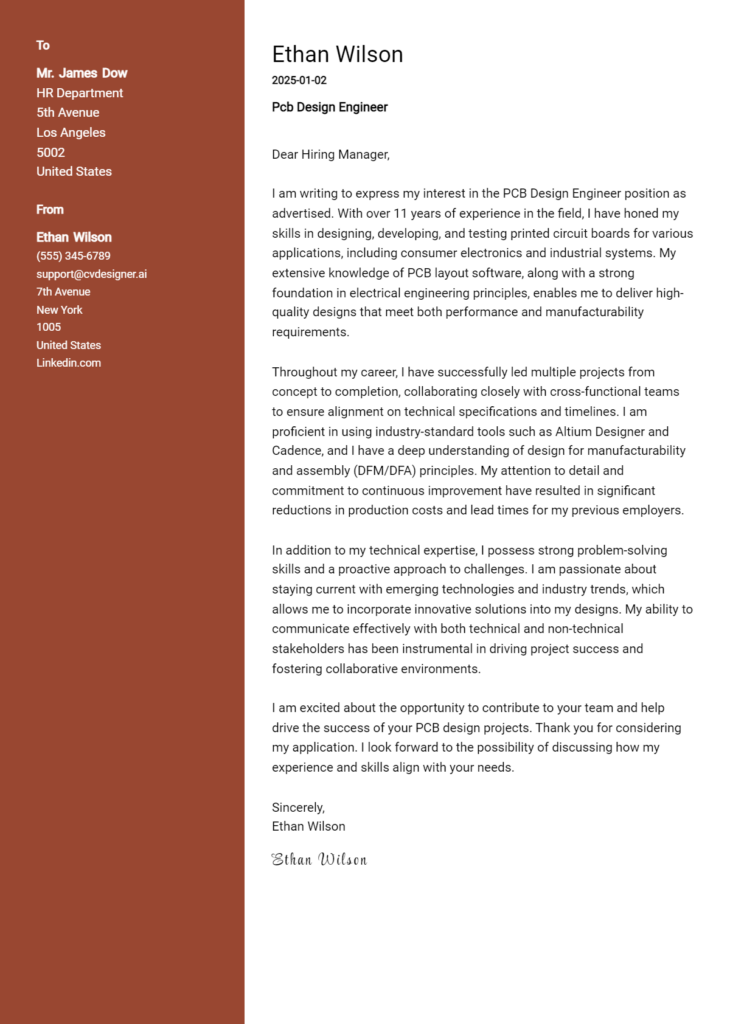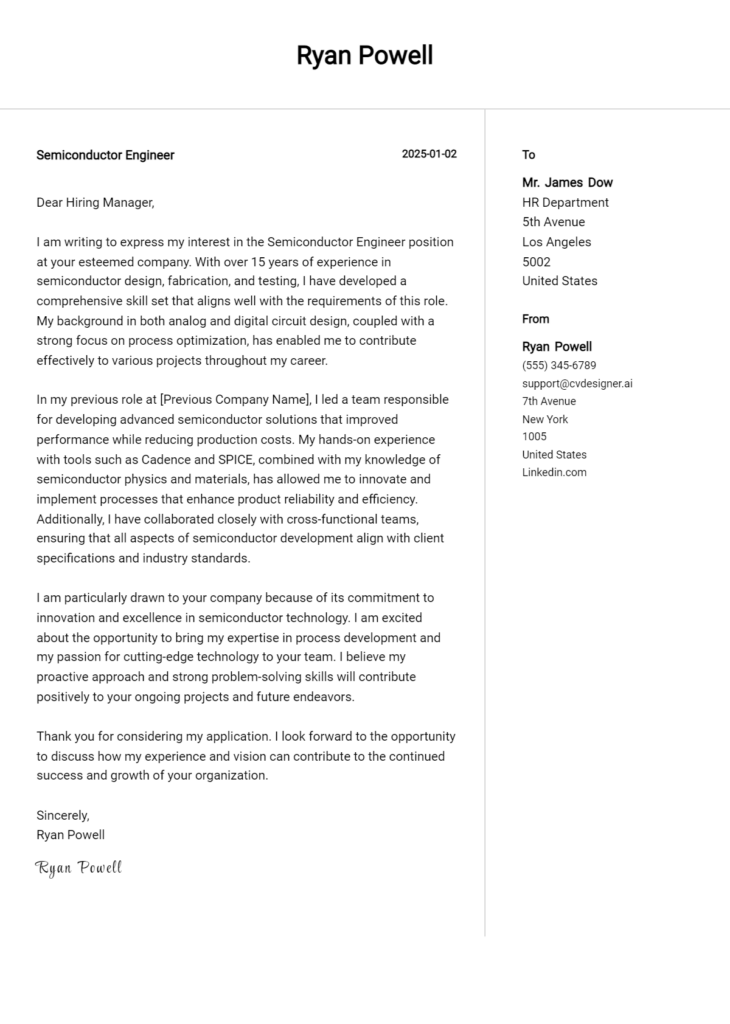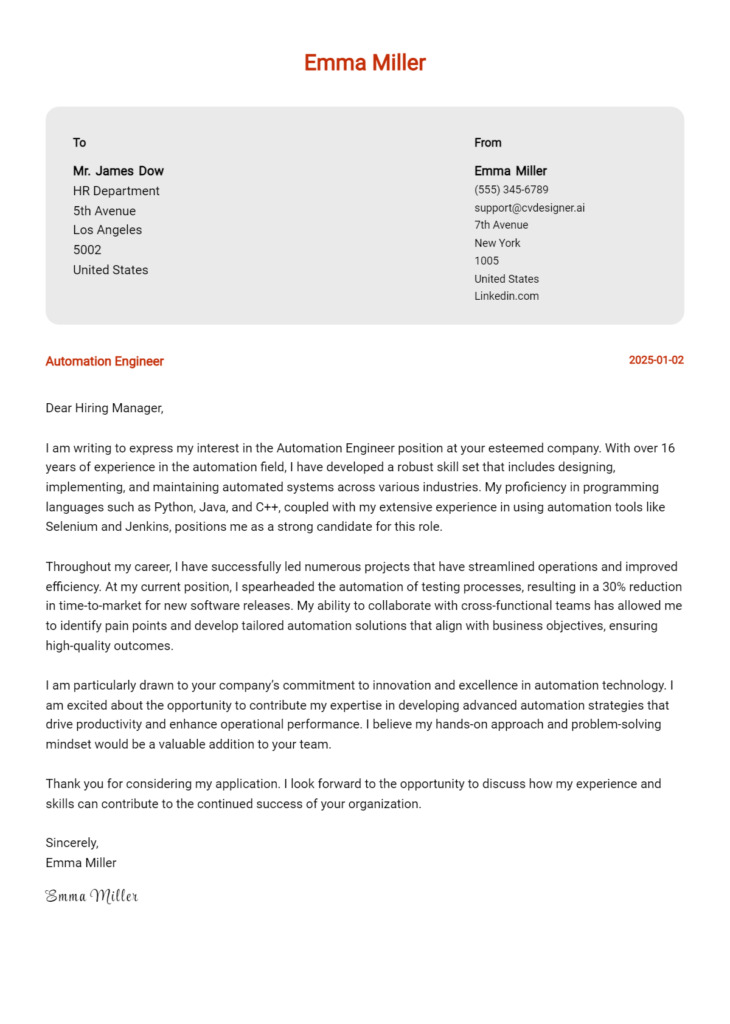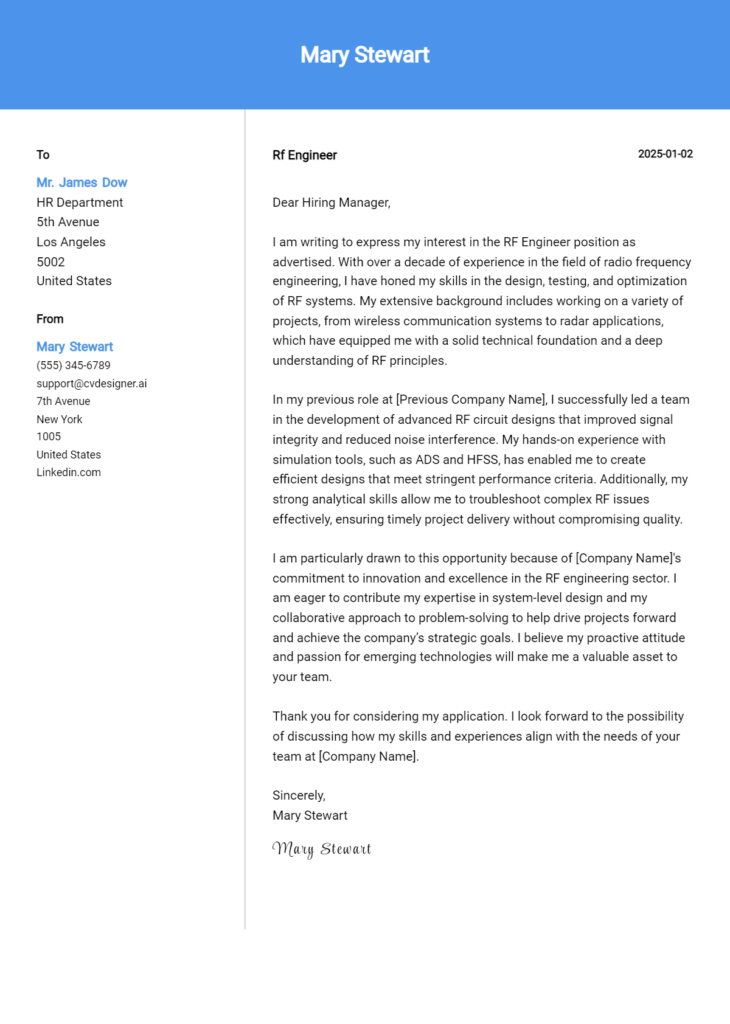Electrical Engineer Cover Letter Examples
Explore additional Electrical Engineer cover letter samples and guides and see what works for your level of experience or role.
How to Format an Electrical Engineer Cover Letter
Crafting a compelling cover letter is essential for electrical engineers, as it serves as your first opportunity to make a lasting impression on potential employers. Proper formatting not only demonstrates your professionalism but also showcases your technical skills and attention to detail—qualities that are indispensable in the engineering field. A well-structured cover letter can effectively communicate your qualifications, highlight your problem-solving abilities, and set you apart from other candidates.
In this guide, we will outline the key components of a professional electrical engineer cover letter, providing insights and examples tailored to the engineering domain.
We'll focus on the essential elements, including:
- Cover Letter Header
- Cover Letter Greeting
- Cover Letter Introduction
- Cover Letter Body
- Cover Letter Closing
Each section is crucial in presenting your expertise and suitability for the role. Let’s explore how to format your electrical engineer cover letter to make it truly stand out.
Importance of the Cover Letter Header for an Electrical Engineer
The cover letter header is a critical component of your application as an Electrical Engineer. It sets the tone for your professionalism and attention to detail right from the start. A well-organized header should include your contact information, the date, and the recipient's details, ensuring that the reader can easily reach you and understand the context of your application. Clarity and professionalism are paramount; a strong header can make a positive first impression, while a weak header may convey carelessness.
Here are examples to illustrate the difference:
Strong Example:
John Doe 123 Electrical Ave Engineering City, CA 91011 johndoe@email.com (123) 456-7890 October 1, 2023 Hiring Manager XYZ Engineering Solutions 456 Tech Lane Innovation Town, CA 91234
Weak Example:
john d. email: johndoe@email.com 10/1/23 xyz eng.
Importance of the Cover Letter Greeting for an Electrical Engineer
The greeting of a cover letter plays a crucial role in setting the tone for the rest of the document. It serves as the first impression and can either invite the reader in or create a sense of detachment. A well-crafted greeting demonstrates professionalism and shows that you've taken the time to personalize your application by addressing the hiring manager directly. This personal touch not only reflects your attention to detail but also your genuine interest in the position. To avoid generic greetings, it's advisable to conduct a bit of research to find out the name of the hiring manager or the relevant contact person. If their name is not available, consider using a more specific title or department. Here are examples of strong and weak greetings for an Electrical Engineer cover letter:
Strong Greeting Example
Dear Dr. Smith,
Weak Greeting Example
To whom it may concern,
The Importance of a Compelling Cover Letter Introduction for an Electrical Engineer
A well-crafted cover letter introduction is crucial for an Electrical Engineer as it sets the tone for the entire application. This opening paragraph should not only capture the hiring manager's attention but also clearly express the candidate's enthusiasm for the role. Additionally, it should briefly highlight key skills or notable achievements that make the candidate a strong fit for the position. A strong introduction can differentiate a candidate from others, creating a lasting impression that encourages the hiring manager to read further. In contrast, a weak introduction may fail to engage the reader, diminishing the chances of the candidate being considered for the role.
Strong Example
Dear Hiring Manager, I am excited to apply for the Electrical Engineer position at ABC Corporation, where I can leverage my five years of experience in renewable energy systems and my passion for innovative design. My recent project, which involved the successful implementation of a solar energy solution that increased efficiency by 30%, showcases my ability to deliver impactful results. I am eager to bring my technical expertise and problem-solving skills to your dynamic team, contributing to projects that shape the future of sustainable energy.
Weak Example
To Whom It May Concern, I am applying for the Electrical Engineer job. I have some experience in electrical engineering, and I think I would be a good fit. I have worked on various projects, but I don’t have anything specific to mention. I hope you consider my application.
Purpose of the Cover Letter Body for an Electrical Engineer
The body of a cover letter for an Electrical Engineer serves as a critical platform for candidates to articulate their technical skills, relevant experiences, and the unique value they bring to a prospective employer. This section should not only detail the candidate’s qualifications but also highlight specific projects or accomplishments that demonstrate their problem-solving abilities and innovation in the field. By providing concrete examples, such as successfully leading a project to design and implement a renewable energy system, candidates can effectively illustrate their proficiency in electrical engineering concepts and tools. Furthermore, this portion of the cover letter allows applicants to connect their experiences with the company's goals, thereby showcasing their enthusiasm and fit for the role.
Strong Example
In my previous role at XYZ Engineering, I successfully led a team to design a solar power installation that increased energy efficiency by 30% for a major client. This project not only required advanced technical knowledge in electrical systems but also effective collaboration with cross-functional teams to meet tight deadlines. My hands-on experience with AutoCAD and MATLAB allowed me to develop innovative solutions that reduced costs and improved performance. I am excited about the opportunity to bring my expertise in renewable energy systems to your team at ABC Corp, which is known for its commitment to sustainable engineering practices.
Weak Example
I have worked as an Electrical Engineer for a few years and have done some projects. I know how to use various software and have some experience in the field. I think your company is good, and I would like to work there because it seems interesting.
Importance of the Cover Letter Closing for an Electrical Engineer
The closing paragraph of a cover letter is crucial for reinforcing your qualifications, expressing enthusiasm for the position, and encouraging the hiring manager to take the next steps, such as reviewing your resume or scheduling an interview. A strong closing leaves a lasting impression and demonstrates your professionalism and eagerness for the role. Conversely, a weak closing can undermine the overall impact of your application, making it appear less thoughtful or engaged.
Strong Example
Thank you for considering my application for the Electrical Engineer position at [Company Name]. I am excited about the opportunity to contribute my expertise in circuit design and renewable energy systems to your innovative projects. I believe my background in electrical engineering and my passion for sustainable technology align well with your team's goals. I look forward to the possibility of discussing how I can help [Company Name] achieve its objectives. Please feel free to contact me to schedule an interview at your convenience. Thank you again for your time and consideration.
Weak Example
I hope you look at my resume. I think I would be okay for the Electrical Engineer job. Let me know if you want to talk. Thanks.
These tips are designed to help aspiring Electrical Engineers craft an effective cover letter that stands out to potential employers. A well-written cover letter is crucial for showcasing not only your technical skills and problem-solving abilities but also your understanding of the software development life cycle (SDLC), your experience in teamwork, and your passion for continuous learning. By highlighting these aspects, you can create a compelling narrative that aligns your qualifications with the needs of the employer.
Tips for Writing an Effective Cover Letter as an Electrical Engineer
Highlight Your Technical Skills
Begin your cover letter by emphasizing your technical expertise relevant to the job. Include specific skills such as circuit design, simulation software proficiency (e.g., MATLAB, AutoCAD), and any certifications you hold. This demonstrates your competency and readiness to tackle the technical challenges of the role.Demonstrate Problem-Solving Abilities
Use examples from your previous experiences to illustrate your problem-solving capabilities. Discuss a specific project where you identified a technical issue and successfully implemented a solution. This not only showcases your analytical skills but also your ability to think critically under pressure.Showcase SDLC Knowledge
If the position involves software or systems engineering, it’s essential to mention your understanding of the Software Development Life Cycle (SDLC). Briefly describe your experience with SDLC phases and how you've applied this knowledge in your projects, ensuring you align your skills with the job requirements.Emphasize Teamwork and Collaboration
Electrical engineering often requires working in teams. Share experiences that demonstrate your ability to collaborate effectively with colleagues from various disciplines. Highlight any leadership roles or contributions to team projects, showcasing your communication skills and ability to work harmoniously in a group setting.Express a Passion for Continuous Learning
The engineering field is rapidly evolving, and employers appreciate candidates who are committed to professional development. Mention any courses, workshops, or certifications you’re pursuing, and express your enthusiasm for staying updated with industry trends and technologies. This conveys your proactive attitude toward learning and growth.
For further assistance, consider using cover letter templates or a cover letter builder to refine your presentation and ensure your cover letter is polished and professional.
Common Mistakes to Avoid in an Electrical Engineer Cover Letter
Crafting a compelling cover letter is essential for standing out in the competitive field of electrical engineering. Avoiding common mistakes can significantly enhance your chances of landing an interview. Here are some pitfalls to watch out for:
Generic Salutation: Using "To Whom It May Concern" can make your letter feel impersonal. Research the hiring manager’s name and address them directly.
Lack of Specificity: Failing to tailor your cover letter to the specific job can make it seem like a template. Highlight your relevant skills and experiences directly related to the job description.
Overly Technical Language: While showcasing your technical expertise is important, using jargon that the hiring manager may not understand can alienate them. Keep your language clear and accessible.
Ignoring the Company’s Needs: Not addressing how your skills can meet the company's specific challenges can weaken your cover letter. Research the company and align your qualifications with their goals.
Typos and Grammatical Errors: Simple mistakes can undermine your professionalism. Always proofread your letter or have someone else review it.
Too Long or Too Short: A cover letter should be concise and to the point—ideally one page. Ensure you provide enough detail without overwhelming the reader. For more on how to structure your letter, check out this cover letter format.
Neglecting to Showcase Achievements: Avoid merely listing your job duties. Instead, focus on specific accomplishments that demonstrate your impact in previous roles. For examples of effective cover letters, visit cover letter examples.
By steering clear of these common mistakes, you can create a cover letter that effectively showcases your qualifications and makes a positive impression on potential employers.
Cover Letter FAQs for Electrical Engineer
What should I include in my cover letter as an Electrical Engineer?
When writing your cover letter as an Electrical Engineer, start by introducing yourself and stating the position you’re applying for. Highlight your educational background, relevant certifications, and technical skills such as proficiency in software like AutoCAD or MATLAB. Discuss your professional experience, focusing on specific projects that demonstrate your expertise in electrical design, troubleshooting, or systems analysis. Tailor your content to reflect the job description, showing how your skills align with the company's needs. Finally, express your enthusiasm for the position and the organization, and conclude with a strong call to action, inviting the employer to discuss your application further.
How can I make my cover letter stand out?
To make your cover letter stand out, personalize it for each job application. Research the company and mention specific projects or values that resonate with you. Use quantifiable achievements, such as “improved system efficiency by 20%” to showcase your impact in previous roles. Employ a professional yet engaging tone, and avoid generic phrases; instead, use active language and strong verbs. Additionally, include keywords from the job description to ensure your cover letter aligns with what the employer is seeking. Finally, keep the layout clean and professional, using bullet points for key achievements, ensuring readability and visual appeal.
Should I address my cover letter to a specific person?
Yes, addressing your cover letter to a specific person is highly recommended. Doing so shows that you've done your research and are genuinely interested in the position. If the job posting doesn’t specify a name, check the company’s website or LinkedIn, or call the organization to inquire. Using a personalized greeting like “Dear Hiring Manager [Name]” can make a positive impression. If you can't find a name, “Dear Hiring Manager” is a suitable alternative, but avoid generic greetings like “To Whom It May Concern.” A personalized address demonstrates initiative and sets the tone for a more engaging and tailored application.
How long should my cover letter be?
Your cover letter should be concise, ideally one page in length, or approximately 3-4 paragraphs. Each paragraph should have a clear purpose: the introduction should state the position you're applying for, the body should elaborate on your qualifications and relevant experiences, and the conclusion should express enthusiasm and invite the employer to connect. Aim for clarity and precision, keeping sentences and paragraphs short to maintain the reader's attention. Avoid overwhelming details; instead, focus on your most impressive achievements and relevant skills. A well-structured, succinct cover letter shows you value the employer’s time and can communicate effectively, both essential traits for an Electrical Engineer.
Build your Cover Letter in minutes
Use an AI-powered cover letter builder and have your letter done in 5 minutes. Just select your template and our software will guide you through the process.

